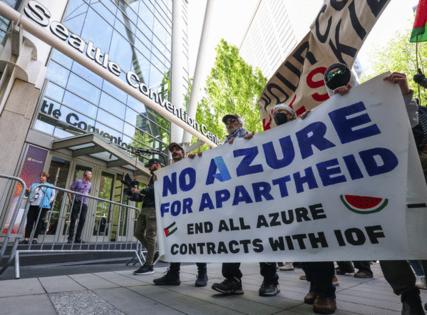Microsoft launches formal review into Gaza surveillance claims
Published in Business News
Microsoft said Friday that it's conducting an independent review of the use of its cloud computing technology by the Israeli Defense Forces, following several recent media reports.
For months, Microsoft has been facing ongoing pressure from employees and activists over its commercial relationship with Israel's Ministry of Defense.
The Redmond-based tech giant said in a May blog post it found no evidence through an internal review that its Azure cloud technology was used to target or harm people in Gaza.
Microsoft maintained then it provided the Israel Ministry of Defense with software, professional services, cloud and AI services and language translation. It also added that it provides cybersecurity services to the Israeli government and other countries in the Middle East.
On Friday, Microsoft updated the blog post, saying it doesn't always have full visibility into how its customers use its software on their own servers or devices.
The change comes in response to reports from The Guardian, Israeli-Palestinian publication +972 Magazine and Hebrew-language outlet Local Call citing anonymous sources that said a unit within the Israeli Defense Forces was using Azure servers to store troves of data. The reports added that the data included millions of mobile phone calls made by Palestinians living in Gaza and the West Bank that has shaped military operations" in those areas.
On Friday, Microsoft said that the claims made in The Guardian's report would violate the company's standard terms of service.
"Microsoft appreciates that The Guardian’s recent report raises additional and precise allegations that merit a full and urgent review," the company said Friday. "The company will share with the public the factual findings that result from this review, once it is complete."
The company tapped the law firm Covington & Burling LLP to conduct the review.
No Azure for Apartheid, an activist organization with current and former Microsoft employees involved, responded to Microsoft's announcement by saying the move was another tactic to delay cutting ties with the Israeli military.
"Microsoft's so-called urgent inquiry into its business with Israel's Unit 8200 is nothing more than a stalling tactic," said Abdo Mohamed, a No Azure for Apartheid organizer, in a statement.
Just like it did in May, the group said it is actively applying pressure on Microsoft to disclose all ties with the Israeli military, terminate any contracts and call for a ceasefire.
Mohamed was one of two workers who said they were fired for organizing an unauthorized vigil at Microsoft's Redmond, Washington, headquarters for Palestinians killed in Gaza during the Israel-Hamas war.
Hossam Nasr was the other fired employee. He's also an organizer for No Azure for Apartheid.
The group has ramped up protests and demonstrations since then, showing up to Microsoft events hosted by the company and others.
The group stationed protesters outside a Microsoft-focused event held by tech publication GeekWire in March at the event venue, Town Hall Seattle. During the event, a group member disrupted a chat with Microsoft President Brad Smith, demanding the company cut ties with Israel and calling him a war criminal until they were escorted out.
Similar disruptions occurred during Microsoft's 50th anniversary celebration in April. One employee interrupted a panel between CEO Satya Nadella, former CEO Steve Ballmer and founder Bill Gates. Another disrupted an address from AI CEO Mustafa Suleyman.
Both were fired.
At both events, other protesters chanted but weren't met with any force outside. Tensions reached a flash point in May during Microsoft's developer-focused Build conference at the Seattle Convention Center.
Disruptions during speeches erupted at Build. Not long after Nadella's keynote address kicking off the conference started, a protester interrupted it before being escorted out.
As Nadella's keynote address wrapped up, dozens of No Azure for Apartheid demonstrators marched from a rally Westlake Park to the Seattle Convention Center, where they faced a closed entrance to the building.
After blockading the entrance near the convention center arch, protesters marched around the building to a back entrance underneath Interstate 5 and attempted to push their way in. They were met swiftly by private security, Seattle police officers and some were sprayed with pepper spray.
No Azure for Apartheid's protest at Build occurred days after Microsoft's initial blog post about its relationship with the Israeli government. A blog post that the activist group rejected as well, calling it "absurd justifications."
"In one breath, they claim that their technology is not being used to harm people in Gaza," Nasr said in a statement. "While also admitting they don’t have insight into how their technologies are being used.
©2025 The Seattle Times. Visit seattletimes.com. Distributed by Tribune Content Agency, LLC.












Comments